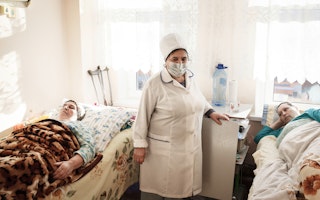A Global Victory for Palliative Care
By Mary Callaway & Sebastian Krueger
On May 23, the World Health Organization passed its first ever stand-alone palliative care resolution. It calls on all member states to integrate palliative care and pain relief into their national health systems. I spoke with Mary Callaway, director of the Open Society International Palliative Care Initiative, about its significance.
What does this resolution do?
World Health Organization resolutions serve to encourage member states to make policy changes and to provide guidance on global health policy that should be implemented at the country level. This historic resolution calls on all member states to integrate palliative care and pain relief into their national health systems.
This resolution is important because it requires the WHO to develop a global implementation plan to:
- work with national governments to integrate palliative care into national health policies;
- educate and train health care professionals;
- remove legislative barriers restricting access to opioid medications for pain relief;
- ensure essential palliative care medicines are available;
- provide palliative care across all levels of care including inpatient facilities and home care.
Why is a global palliative care plan needed?
More than six billion people worldwide have little access to pain relieving medications for the control of pain. The WHO estimates that of the 58 million people dying annually, about 80 percent would benefit from palliative care in their final days of life.
The world is experiencing a “silver tsunami,” with a growing number of older persons and a heavy burden of noncommunicable diseases like cancer, heart disease, and neuro-degenerative diseases. The majority of people who need palliative care live in low- and middle-income countries where there is little access to even basic palliative care services. Adults and children with life-threatening illnesses require treatment and palliative care at the same time, so their pain and symptoms can be managed and they and their families can receive the psychological, social, and spiritual support they need.
How did the Open Society Foundations and other palliative care advocates achieve this victory?
This resolution is the result of years of advocacy by the Open Society Foundations; many individual palliative care champions; and national, regional, and international palliative care associations. These include our grantees, like the African Palliative Care Association, Asia Pacific Hospice Network, European Association for Palliative Care, International Association for Hospice and Palliative Care, International Children’s Palliative Care Network, Worldwide Palliative Care Alliance, and Human Rights Watch.
Advocates held thousands of meetings with health policy makers, UN agencies, government development agencies, and private NGOs—educating them about palliative care and the barriers to essential pain relieving medicines, and supporting study tours for government officials to see firsthand what palliative care really is.
Advocates published dozens of articles in leading medical journals and gave thousands of presentations at national, regional, and international medical conferences on cancer, pediatrics, geriatrics, cardiology, and HIV. All of this got palliative care on the agenda of lawyers, health economists, and spiritual leaders.
These efforts convinced numerous ministries of health to create working groups charged with reforming health care education and training, developing health policies and legal frameworks, reforming drug policies, revising health care financing, reallocating human resources, and creating palliative care services in existing health facilities.
What are the next steps for advocates to ensure that palliative care is a universally recognized right?
Implementation of the resolution will require coordinated collaboration and leadership.
The WHO will need time to develop their implementation plan, and this will require the technical assistance of palliative care experts. International, regional, national and local palliative care leaders, human rights advocates, and leading international organizations will need to work with the WHO, and local governments to create the necessary frameworks to integrate palliative care in their countries.
The development of the field of palliative medicine and the practice of palliative care began initially in the UK in the early 1970s. In the intervening years, amazingly dedicated health care providers made palliative care services possible. They often volunteered their time and expertise because they knew there was a better way to care for patients—that they had a right to pain and symptom relief, and families had the right to support.
Local fundraising efforts—from concerts to marathons—led by patients’ families have raised public awareness and supported community services. Government officials’ personal experiences, watching their own loved ones die in needless suffering, ignited their own desires to improve the health care systems in their countries.
Change takes time and requires stakeholders to work together. It doesn’t happen linearly, but with many strands of overlapping work intertwining and building on each other.
The WHO resolution is a truly pivotal victory. But in so many ways, the work has just begun.
Until January 2015, Mary Callaway was the project director of the International Palliative Care Initiative with the Open Society Public Health Program.
Until May 2016, Sebastian Krueger was the communications officer for the Open Society Public Health Program.


